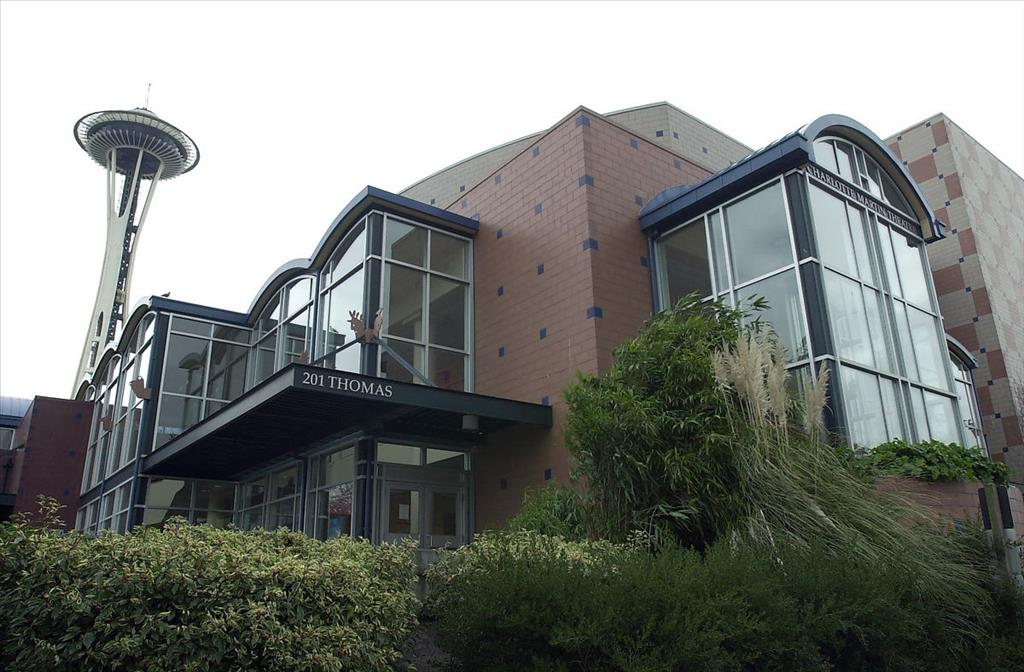Seattle Theatres Leverage Collaboration to Grow Stronger
A feature on emerging partnerships between Seattle theatres. | By David Drury

Change is in the air for a growing handful of Seattle’s vaunted performing arts organizations, and perhaps for once it feels less like the old familiar struggle-to-survive story, and more like signs of strength, life, and new growth in the theatre arts industry. The name of the game is strategic collaboration.
Over the summer, longtime Seattle Center neighbors Seattle Rep and Seattle Children’s Theatre joined forces by way of a phased rollout, sharing box office and administrative services. The move was precipitated by extensive studies and months of internal conversation. One of those studies was produced in partnership with ArtsFund, which has long supported the arts sector in Washington through leadership, advocacy, and grantmaking, distributing more than $115 million to arts organizations since its founding in 1969.
“Arts organizations are confronting shifting realities with new and innovative solutions that rely on collaborative approaches,” said ArtsFund President and CEO Michael Greer. “Seattle Rep and Seattle Children's Theatre are critical participants in the Washington state arts and culture community and their willingness to cooperate around shared solutions is encouraging to see.”

“Our part-time box office team has been able to offer stellar customer service, but with limited resources,” said Seattle Children Theatre’s Managing Director Kevin Malgesini. “Collaborating with Seattle Rep on a shared box office will allow us to offer staff more career pathways and theatergoers a more consistent customer experience.”
Founded in 1963 and winner of the 1990 Tony Award for Outstanding Regional Theatre, Seattle Rep is the largest nonprofit resident theatre in the Pacific Northwest. Led by Artistic Director Dámaso Rodríguez and Managing Director Jeffrey Herrmann, the theatre begins its 62nd Season in September with Thornton Wilder’s The Skin of Our Teeth. Seattle Children’s Theatre, likewise, has grown to be one of the premiere theatres for youth facilities in the country, producing over 280 plays and reaching 4 million children. SCT is launching its 50th anniversary season with a production of Cat Kid Comic Club: The Musical.
But the pair of venerated companies aren’t the only regional theatre pillars locking arms. Seattle icons ACT Contemporary Theatre and Seattle Shakespeare Company have announced that they are exploring a merger of their own.
For 59 years and counting, ACT has anchored the voice of contemporary theatre in the Pacific Northwest, producing more than 300 plays and musicals, including 49 world premieres. Led by Artistic Director John Langs, ACT pursues work that sparks curiosity in the human condition and nurtures theatre-makers of the next generation. Seattle Shakespeare Company was founded in 1991 by local theatre artists and quickly developed into Washington State’s only year-round, professional classical theatre company. Their education programs have served thousands, and touring productions have brought Shakespeare into schools and communities throughout Washington State. A partnership between the two would aim to serve the mission of both theatres under one roof in ACT’s current home at 700 Union Street, the city’s historic theatre district.

So why are such mergers happening? Is this a matter of survival; a shake-up after the Covid pandemic; a seasoned business strategy; a combination of factors?
“It’s all of the above!” said Alyssa Montgomery, ACT’s general manager who has served in various roles with ACT since 2007. “Even before Covid, there were signs that our industry needed to adapt its business model. Some signals were declining subscriptions and expenses increasing at exponential rates. As we respond to all these pressures, changes in thinking and new solutions are necessary and theatres are responding to all those pressures.” Montgomery affirmed that the phenomenon is happening in markets beyond Washington State, pointing to a recently announced partnership between SoHo Rep and Playwrights Horizons, two powerhouse New York City theatres looking to leverage the strengths of each company and share venue space.
ACT Artistic Director John Langs went further. “This is an extraordinary time in our industry,” he said. “The head winds are strong but so is the theatre. It always has been. What we are trying to do is get out of the box. Meet the moment with an idea that isn’t zero sum thinking. We are creating something new and building something different. The energy we need to break the cycle of shrink and cut can’t happen by doing the same thing harder. We have to do something different. That is what the merger represents. We can’t allow fear to hold us back. If this doesn’t happen it’s because the folks who had the power to make decisions got scared.”
While both initiatives have the potential to evolve into long-term, permanent partnerships, for Seattle Rep and Seattle Children’s Theatre, they have initially committed to a single pilot year of investigation and implementation during the 2024/25 Season, after which they may explore expanding their collaboration. For ACT and Seattle Shakespeare Company, a Memorandum of Understanding was still pending at press time, with an eye towards having a legally sound agreement in place by the end of the year.

“What has made Seattle theatre incredibly special over the years is the sense of collaboration and collegiality among the different theatre organizations,” said Seattle Shakespeare Company Executive Director John Bradshaw. “This is what makes Seattle one of the most important cities for theatre in the country.”
Dámaso Rodríguez, artistic director at Seattle Rep, pointed out that while an outsider might see collaboration as serving to make organizations more similar, it actually allows each theatre to better pursue its own individual artistic vision and mission.
“We have mounted a lot of co-productions (shared shows that are built and rehearsed at one venue before traveling to others) with other regional theatres over the years,” said Rodriguez. “While those projects have helped us share some costs and build relationships with artists, they have also required us to compromise with our partners on certain key artistic decisions, from selecting the director and creative team to refining set designs to meeting space needs or budget constraints across all partner venues.”
What that means is that not every choice audiences see on stage reflects Seattle Rep’s own independent artistic vision and values, which Rodriguez suggested can undermine our artistic identity. “I’m committed to moving our theatre toward producing as many of our shows as possible on our own. Increasing our internal capacity to build all or most of our core season puts us in a good position to identify and bring in exciting shows from elsewhere that we might not be able to produce from scratch ourselves.”
Early indications are that theatregoers are adapting well to the idea of collaboration.
“I see a lot of reasons for hope,” said Rodriguez. “Especially when I look at the enthusiastic response we’ve received from Seattle Rep supporters, many of whom also bring their family to Seattle Children’s Theatre and are excited to see two of their favorite organizations finding new ways to adapt to changing times. This is a great opportunity to experiment with how we can collaborate with another theatre and adapt the way we go about our work together, while retaining complete artistic independence and control over the work on our stages.”



